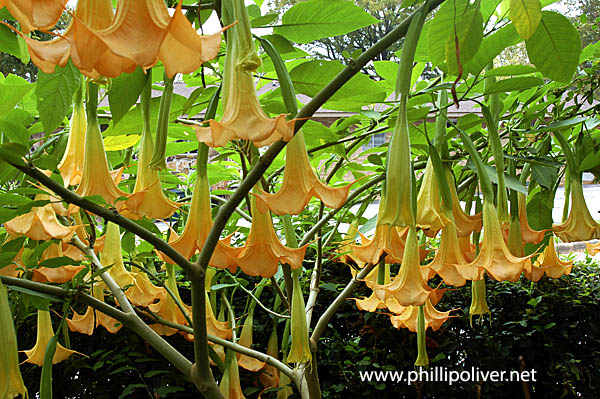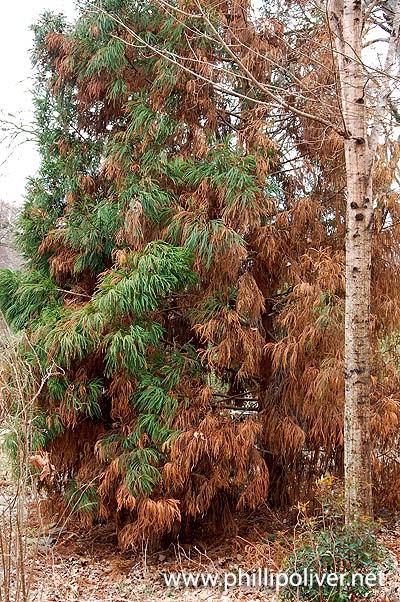 The Angel's Trumpet is one of our most spectacular plants. It is one that can stop non-gardener's in their tracks to inquire about it. We have a glorious yellow one (most likely "Charles Grimaldi") growing in our vegetable garden area in a raised bed next to the street. It grows tall and stately, extending above the hedge, and the blooms are on display to anyone driving or walking past. I'd often had people stop and ask me about it when I'm out there working.
The Angel's Trumpet is one of our most spectacular plants. It is one that can stop non-gardener's in their tracks to inquire about it. We have a glorious yellow one (most likely "Charles Grimaldi") growing in our vegetable garden area in a raised bed next to the street. It grows tall and stately, extending above the hedge, and the blooms are on display to anyone driving or walking past. I'd often had people stop and ask me about it when I'm out there working.
They are very easy to grow but oddly, you don't see many in people's gardens. This could be due to their reputation. All parts of the plant are poisonous to both animals and humans if ingested. We've always had pets around and I've never seen one munching on one so I suspect they have enough common sense to stay clear of them.
Brugmansia (and the closely related Datura) are in the Nightshade family and are well known as plants that can induce wildly hallucinogenic states. The American Indians used the plant to bring about a change in conscience and thought that the intoxicating effects could put them in contact with the Gods and the spirits of their ancestors. Peruvian Indians called it "the plant of the grave" and thought that if a person feel asleep under the shade of one, they would go mad.
Medicinal purposes of the plant have also been touted and it was once used to make Hyoscine, a drug for motion sickness, although Datura is mainly used as a source for it today.
The Angel's Trumpet is a native of South America. Blooms are usually yellow, pink or white and are the main attraction of the plant. They begin to bloom in Summer and last on and off through the Fall. They always put on a dramatic show in the Fall right before the first frost. They can be grown either in the ground or in a container but either way, they must be brought in during the winter months or protected somehow because they are not hardy below freezing. I have successfully over-wintered plants during mild winters under thick layers of mulch but a harsh winter (like our last one) will surely do them in.
Container Plants
Angel's Trumpet can easily be grown in a container and the type of container does not matter (although clay pots may have to watered more frequently than plastic ones). The container should be large and wide to accompany the root growth and a layer of rocks in the bottom is advisable to keep plants from tipping over. A general potting mix is fine and it should be mixed with 1/3 garden loam. These are thirsty plants and have to be watered almost daily, especially in hot summer months. Good drainage is essential. Weekly fertilization, with a mineral and nitrogen‐rich fertilizer
, is needed for good bloom development. Place containers in a partly sunny location although sun during the hottest part of the day can fade the flower color. Protect from wind! A beautiful pink Angel's Trumpet grows in a container on our patio and gets bright light but very little direct sun and does quite well there.
Pruning
Pruning is not necessary but can be done if you want more blooms or want a tree form. If you decide to prune, wait until the plant has formed a "Y". You can then force the plant to form more limbs (and thus more flowers). Cut out all but the newest growth and allow it to grow before pruning back to 1/2 to 1 inch from the node. If you prefer a bushier tree, then you must prune a lateral branch. Make the cut at the joint and each joint can produce up to two new branches.
Over-Wintering
Plants can be over-wintered either in a cool or warm environment.
Cool environment:
Leave the plant outside as long as possible so that they can harden off and acclimate to the cooler temperatures. They can be stored in a basement or garage as long as the temperature stays in the 40-50 degree range. Remove any remaining leaves and prune shoots back to healthy tissue. They usually will not need much watering but do not allow the root ball to dry out. In the Spring, after the danger of frost, the plants should be re-potted in a larger pot and brought back outside.
Warm environment:
Angel's Trumpet can also be over-wintered in a warm area, such as a greenhouse or sun-room. The area should have plenty of light and temperatures should be in the 55-65 degree range. Bring the plants in when outside temperatures fall around 50-55 degrees. Reduce watering and fertilizing by half during the winter months.
Propagation
Angel's Trumpets are one of the easiest plants to propagate by cuttings. Cuttings can be taken year round and both leafy and woody cuttings can be used. Six inch cuttings will develop roots in just a few weeks (rooting hormone will hasten the process). Insert 1 1/2 inches of the cutting in a peat and sand mixture and maintain high humidity by covering with plastic.
Rooting can also be easily done in water. Take a 6" cutting and place in a glass of water with the water only covering the lower 1 1/2 inch. Roots will sprout quickly and the cutting can then be put in a small container of soil. Mist with water frequently for several days until the roots take hold.
Fall cuttings - Take 10" cuttings and place in a peat and sand mixture or vermiculite. Keep the soil moist but don't over-water. Place in an area with good light in the 55-65 degree range. Roots will develop by next spring in time for planting.
Text and photos by Phillip Oliver, Dirt Therapy



Thanks for all the information on this beautiful plant. My white one bloomed this year and I love it. It is in my vegetable garden area so no one gets to see it . I may have to move it to a more prominent location so that others may enjoy it next year. Maybe, I could get a cutting from your yellow one some day.
ReplyDeleteGreat post and very informative Philip. I was saddened to have to destroy most of my brugs this past week as they were simply too large to handle any longer, particularly as I am recovering from my shoulder surgery. I did keep a couple divisions of a pink one and my Inca Sun, which I hope to propagate, as it is a much more constant bloomer and doesn't grow as huge as the rest of my plants did... one thing's for sure... many wonderful hours were spent sitting beneath the many blooms of the brugs on cool summer evenings... the fragrance filled the entire garden! Larry
ReplyDeleteYes, I love mine too! Zone 8 mine dies back in the winter, but returns wonderfully in Spring.
ReplyDeleteThese always make me think of the tropics. Yours has so many blooms on it. Simply beautiful. It is no wonder people stop, stare and ask you questions about it. The only place I have seen them growing in gardens is in Trinidad. They were quite common there.
ReplyDeleteYou touched upon this in general theme. On a specific note, I wanted to add that this is a Deer Resistant plant as well.
ReplyDeleteThank you, Philip, for the great post. My first plant is starting to bloom and it's white - beautiful & fragrant! I think I'm going to winter mine over in the garage. Will have to remember to water from time to time since I've discovered already that it loves water. Your posts are always so enjoyable and informative.
ReplyDeletePhillip I have 1 which is about 3 yrs old and hasn't bloomed yet and I haven't brought it in over winter. Last fall I put about 10 inches of sawdust on it. It died back and came back this year. Just wondering what I need to do to get it to bloom? I also have 2 small ones I picked up this summer and my 3 hooligans haven't eaten them or my older one. I have a hooligan cage protecting one near their running path. Thanks for the information. Be sure to vote to help our special needs school get a grant to finish our greenhouse. Link on my blog. Mary
ReplyDeleteI love Brugmansia. You actually reminded me I forgot to order seeds! I'm starting a tonne of plants though so maybe I should wait. They're just so gorgeous.
ReplyDeleteGorgeous. I used to have one in a container, but when I decided to plant it two years ago, we then had an extremely cold winter. It was never seen again! I remember how fragrant it was - yum.
ReplyDeleteThe first year we were here in Alabama the Angel Trumpet's were a mystery to me, I didn't have any idea what they were and then they bloomed and WOW!! What a beautiful fall show! But last year I got only a couple small flowers and this year, not one bud on either of my two plants. What do you supposed it is Phillip? Do they need fertilizer? I was really hoping to see them again this fall.
ReplyDeleteYour brug looks beautiful and very tropical. No wonder people stop and comment.
ReplyDeleteI'll just have to admire yours. I have lost tolerance for all that I had to do for this plant! I think just being north of there made a difference too. They are beautiful!
ReplyDeleteI love this plant too, and the first time I saw it I did a triple take, walked around the block and came back to look at it again. It reminds me of something from The Lorax/Dr. Suess!
ReplyDelete